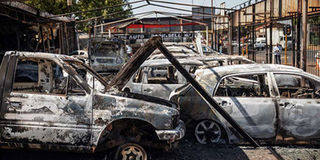Xenophobia pours scorn on Ubuntu

Burned cars belonging to South African car dealership owner Yunus Salajee are seen in Johannesburg suburb of Malvern, on September 4, 2019, after South Africa's financial capital was hit by a new wave of anti-foreigner violence. PHOTO | MICHELE SPATARI | AFP
What you need to know:
- Even in the Southern African country’s current Constitution, Ubuntu is impliedly included by its frequent reference to human dignity.
- Lazy leaders are fast to blame migrants and foreign nationals for ‘flooding’ South Africa and for taking up opportunities meant for the locals.
I may be wrong but something does not seem right in the Rainbow Nation.
It is hard to watch videos of violent attacks by native South Africans against migrants and foreign nationals.
This is an unfortunate incidence, a scorn at the Ubuntu philosophy, which is a belief in a universal bond of sharing that connects all humanity.
It is unfortunate because the term Ubuntu originated from, or was propagated by, the same people who are now defiling it by spilling the blood of those who jointly saved them from the shackles of Apartheid.
In fact, the term appeared in the epilogue of South Africa’s 1993 Interim Constitution, stating: “There is a need for understanding but not for vengeance; a need for reparation but not for retaliation; a need for Ubuntu but not for victimisation.”
Even in the Southern African country’s current Constitution, Ubuntu is impliedly included by its frequent reference to human dignity.
UNEMPLOYMENT
No doubt, South Africans are angry lots. Statistics has the country as one of the most unequal societies in the world with high levels of unemployment and poverty.
According to Statistics South Africa (Stats SA), the rate of unemployment increased to 29 per cent in the second quarter of 2019 from 27.6 in the previous period. This was the highest jobless rate since the first quarter of 2003, as the number of unemployed rose to 6.65 million.
In such a scenario, people are always out to find whom to blame for their joblessness and that is why the hammer is landing hard on poor migrants and foreigners of African descents.
The unemployment largely adversely affects the youth and the attacks and lootings were mostly carried out by young people.
Lazy leaders are fast to blame migrants and foreign nationals for ‘flooding’ South Africa and for taking up opportunities meant for the locals. This is debatable.
The population of South Africa is 58,691,949 as of Wednesday, September 4, 2019, based on the latest United Nations estimates.
MIGRANTS
The statistics also show the migrant population in South Africa to be just over 1.64 million — or 2.82 per cent of the country’s population. Can this small percentage of the migrant population be construed as an influx?
Do those South Africans attacking migrants and foreign nationals honestly believe the latter is responsible for their joblessness, homelessness, poverty and crime?
I have scanned through some of the social media reactions to the attacks and it seems that those whose relatives are affected are an angry lot too.
One post reads: “We should boycott their products, airline etc. And even vow NEVER TO VISIT SOUTH AFRICA until the day her citizens will learn more about UBUNTU.”
What caught my attention in this comment is the “never to visit South Africa” line.
TOURISM
This would be a serious drawback to the enormous efforts put by South African Tourism in prompting the country as a preferred leisure and business destination.
According to South African Tourism’s annual report for 2017/2018, the largest proportion of international tourists to the country were from Africa, about 7.6 million — a whopping 74 per cent of the total international arrivals.
And half of that number hailed from three source markets alone: Zimbabwe, Mozambique and Lesotho.
Other key markets for South African Tourism include Angola, Kenya, Democratic Republic of Congo (DRC) and Nigeria. Citizens of some these core markets are affected by the attacks.
The high number of Africans visiting South Africa for leisure or business does not necessary mean that it is better than any other county in Africa, or elsewhere, where Africans can take a vacation or look to for business tourism.
VALUES
It is the country’s past, and more so the spirit of African humanism — the traditional values of hospitality, primacy of the person, respect for life, sense of the sacred, ‘familyhood’, brotherhood, solidarity and other characteristic features of the communalistic life of an African person — that has created the love for South Africa by Africans.
In a nutshell, South Africans should stop hatred and violence against fellow Africans and, instead, strive to create a dignified, caring and compassionate South Africa that would make its legends — such as Nelson Mandela and Steve Biko — smile in their graves.
Mr Omuodo is a public relations and media consultant. [email protected]




